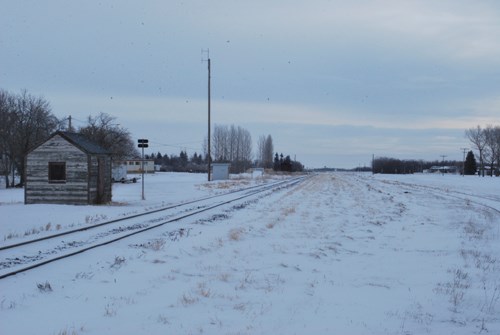A proposal by Canadian National railways to build a crude-oil transfer depot in the community of Carlyle has proved to be controversial, as town council moves to register its disagreement with the planned facility.
The town was initially contacted late last year with a proposal by CN to build what CN referred to as a 'crude transload facility,' or a transfer site where Bakken crude oil would be transferred from truck transports onto rail crude oil haulers for further transport to out-of-province destinations, primarily Ontario.
Also called a 'pipeline on rails,' by some, the facility would be located on existing CN property within the town along the existing CN tracks, bounded roughly by Main Street on the west, and stretching east to the entire south side of Souris Ave. East, east of 4th Ave. East.
In their initial discussions with the town, CN asked any concerns be forwarded to them for address by the appropriate departments within the company.
Following intense discussions, council forwarded the first set of concerns to CN to reply to, and were as follows;
Council expressed concern about the increase in heavy truck traffic in and around residential areas of the town.
There was worry about the potential for vapour loss from the transfer operation, and therefore whether there would be a distinct smell associated with the operation, and would CN include a vapour trapping system to reduce or eliminate that concern.
Concern was expressed whether existing fire services could handle a petroleum product fire should an accident occur.
There was concern raised about dust from the operation affecting residential areas, especially those to the south of the track-line.
Concern was expressed about the fencing of 3rd Street, and it was asked that if such fencing was done, if it could be on the south end of the street.
Council was worried that some playground equipment at Carlyle Elementary School (CES) may actually be on CN property, and if CN could make allowances when fencing that area.
Finally, concern was expressed about the disposition of Centennial Park, land purchased by the town from CN, and appearing to fall within the development plan CN had provided.
CN responded point-by-point to each of the concerns raised by council.
In regards to the truck traffic, CN asserted that initial estimates of traffic flow would average 10 trucks per day over a 10 hour day, or one truck every hour.
Further, CN asserted that the third party operator of the facility would make use of existing provincial trafficways to reduce the impact of truck traffic within the town.
Regarding vapour and potential smells, CN asserted that the product loaded would be 'light, sweet' Bakken crude, therefore smell should not be a large concern.
That aside, CN did commit to including a vapour trapping system should the third party operator use a bottom-loading system at the site.
Regarding the fire concerns raised by council, CN stated in response that its Cargoflo department, as well as the third party operator, could meet with the Fire Marshall to review the MSDS sheet and Emergency Response Plan prior to the operation starting up.
No mention was made about additional resources in the response however.
CN also stated that, in the summer months, the third-party operator would provide dust control on the CN property, within the guidelines of CN Environment.
And in regards to the fencing and property questions, CN conceded that most, if not all of the CES playground equipment was on CN property, however CN would be willing to fence to the south of the equipment, and they would be willing to fence on the south of 3rd St. East.
CN also confirmed town ownership of Centennial Park, and guaranteed its integrity.
Despite these reassurances from CN regarding the list of concerns provided by town council, council, through Chief Administrator Hugette Lutz, expressed its disapproval of the proposal.
"Council has asked me to inform you that because of considerable backlash from the community, the Town of Carlyle is opposed to the Pipeline on Rails operation here within the town limits," Lutz wrote in an e-mail to a CN representative.
When discussion about the proposed crude transload facility came up at the Jan. 18th meeting of town council, council members focused on the fact the facility would be within a short distance of both CES and Gordon Kells High School, as well as the proximity of established residential property to the proposed facility.
When contacted by The Observer for a statement about the project, CN's Warren Chandler, Regional Manager of Public and Government Affairs for Alberta, Saskatchewan, and Manitoba, had this to say.
"CN has been working with the Town of Carlyle regarding the Rail Crude Transload Facility," Chandler said. "However, we are in the early stages of discussion."
Chandler then stated that CN had no further comment at this time.
"People have a lot of concerns about the project, and we are passing it on to CN," said Carlyle Mayor Don Shirley, "It makes sense to use the rail network in this way, and it makes the highways safer, however to do the transferring in the middle of the community carries too many risks."
A similar pipeline on rails project launched by Canadian Pacific Railway in Estevan has been in the works.
As reported in the Dec. 11, 2011 issue of the Estevan Mercury newspaper, in a piece titled, 'Canadian Pacific Rail to transport oil from Estevan,' that project is also located near the heart of the community, and like the proposed facility in Carlyle, safety concerns are being raised.



